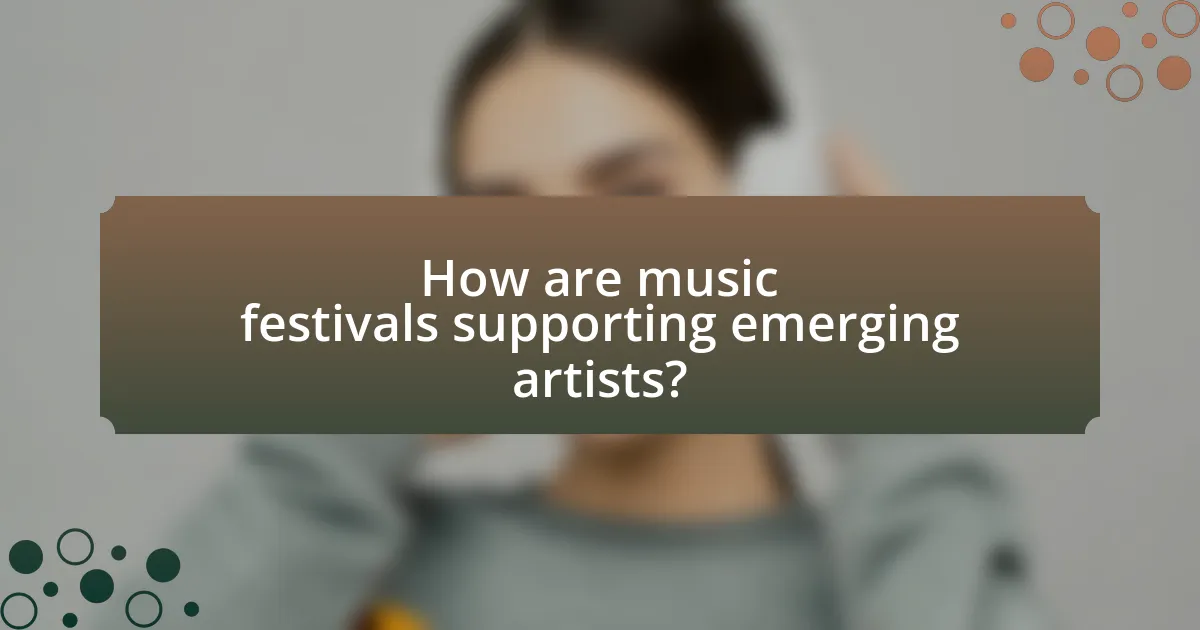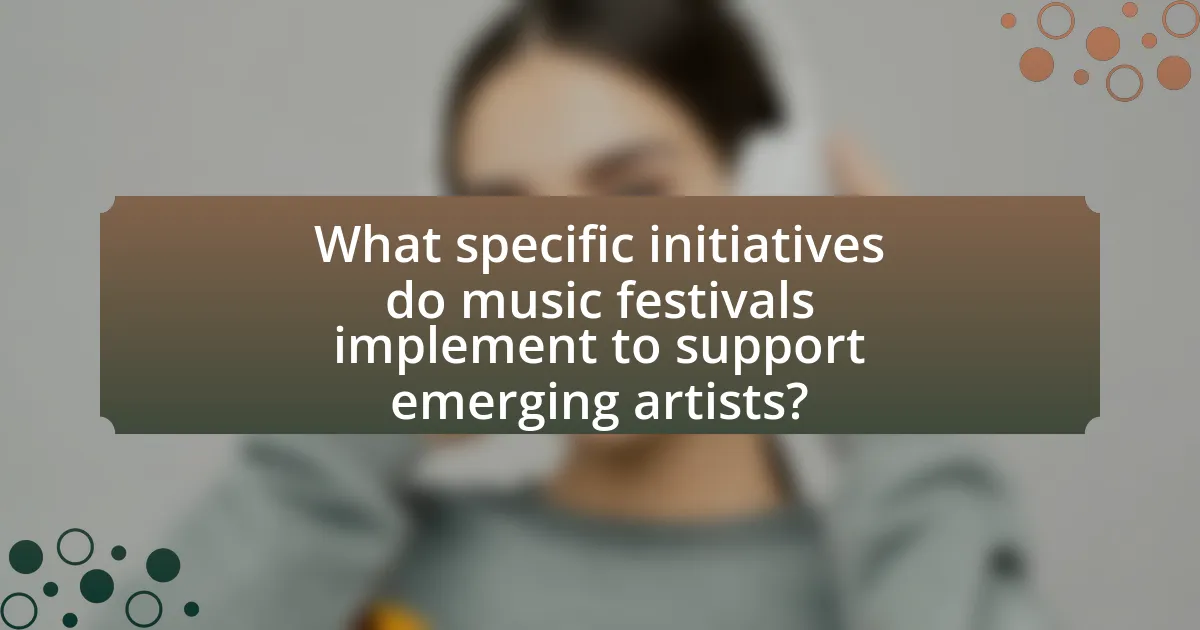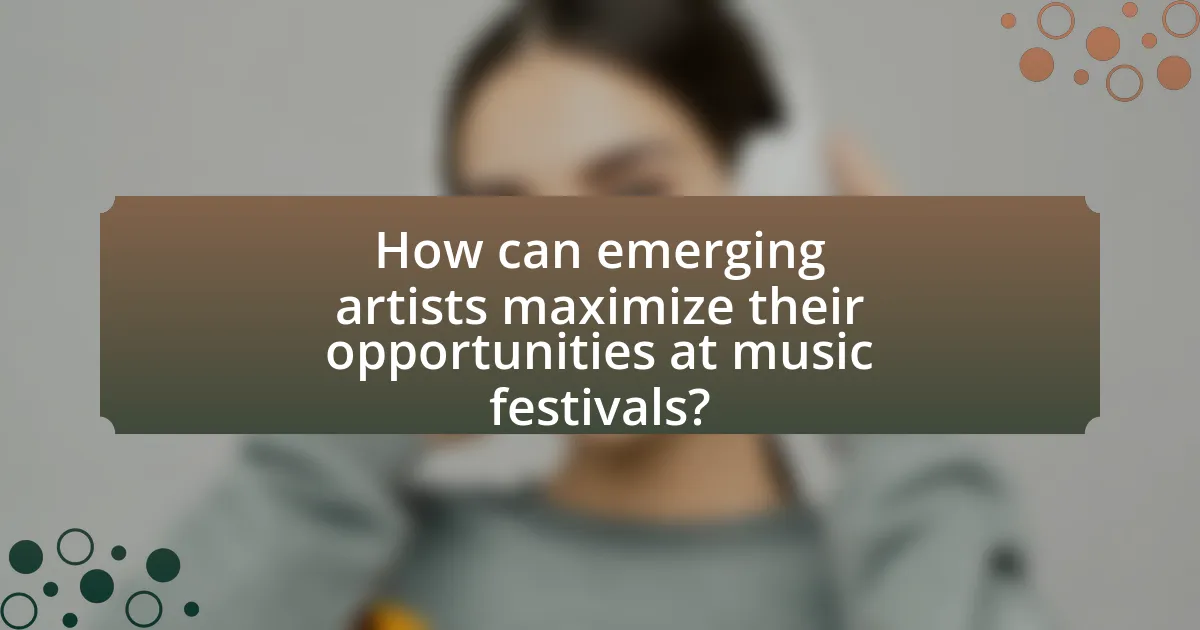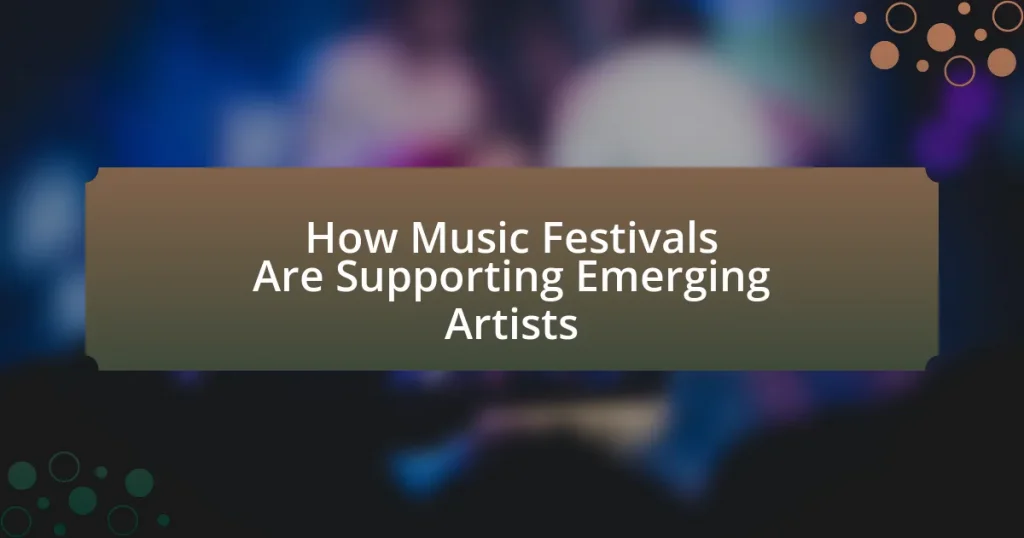Music festivals play a vital role in supporting emerging artists by offering performance opportunities, exposure to larger audiences, and valuable networking possibilities within the music industry. Events such as South by Southwest (SXSW) and Coachella feature dedicated stages for new talent, facilitating connections with industry professionals and potential record deals. Additionally, festivals implement initiatives like mentorship programs and workshops to enhance the skills and visibility of these artists, ultimately contributing to the growth and sustainability of the music scene. The article explores how festivals curate lineups, provide financial support, and create an environment that fosters the discovery of new genres while addressing the challenges faced by emerging musicians.

How are music festivals supporting emerging artists?
Music festivals support emerging artists by providing them with performance opportunities, exposure to larger audiences, and networking possibilities within the industry. Festivals often feature stages specifically dedicated to up-and-coming talent, allowing these artists to showcase their music to festival-goers who may not have encountered them otherwise. For instance, events like South by Southwest (SXSW) and Coachella have dedicated slots for emerging acts, which can lead to increased visibility and potential record deals. Additionally, many festivals collaborate with local music organizations to curate lineups that highlight new artists, further solidifying their role in fostering the growth of emerging talent in the music scene.
What role do music festivals play in the careers of emerging artists?
Music festivals play a crucial role in the careers of emerging artists by providing them with exposure, networking opportunities, and performance experience. These events allow new musicians to showcase their talent to larger audiences, often leading to increased visibility and fan engagement. For instance, festivals like Coachella and Lollapalooza have historically launched the careers of numerous artists by featuring them on prominent stages, which can result in record deals and collaborations. Additionally, the networking aspect of festivals enables emerging artists to connect with industry professionals, including producers and agents, facilitating further career advancement.
How do festivals provide exposure to new talent?
Festivals provide exposure to new talent by offering a platform for emerging artists to perform in front of diverse audiences. This exposure is critical as it allows these artists to showcase their skills, gain visibility, and connect with industry professionals, including talent scouts and record labels. For instance, events like South by Southwest (SXSW) and Coachella have historically launched the careers of numerous artists by featuring them alongside established acts, thereby increasing their reach and credibility. Additionally, festivals often promote new talent through social media and marketing campaigns, further amplifying their visibility to potential fans and industry stakeholders.
What opportunities do festivals create for networking?
Festivals create significant networking opportunities by bringing together artists, industry professionals, and audiences in a concentrated environment. This setting facilitates direct interactions, collaborations, and relationship-building among emerging artists and established figures in the music industry. For instance, events like South by Southwest (SXSW) and Coachella have been known to foster connections that lead to record deals, management contracts, and collaborative projects. Additionally, networking events and panels at these festivals provide structured opportunities for artists to engage with industry experts, enhancing their visibility and career prospects.
Why are music festivals important for the music industry?
Music festivals are crucial for the music industry because they provide a platform for exposure and networking opportunities for emerging artists. These events attract large audiences, allowing new musicians to perform in front of potential fans, industry professionals, and media representatives. For instance, festivals like Coachella and Lollapalooza have historically launched the careers of numerous artists by showcasing their talent to a broader audience. Additionally, music festivals often feature a diverse lineup, which helps to promote various genres and styles, fostering innovation within the industry. This exposure can lead to increased streaming numbers, social media following, and opportunities for future performances, ultimately contributing to the growth and sustainability of the music industry.
How do festivals contribute to the discovery of new genres?
Festivals contribute to the discovery of new genres by providing a platform for diverse musical acts to perform, often introducing audiences to unfamiliar styles. These events curate lineups that include emerging artists alongside established acts, creating an environment where innovative sounds can be showcased. For instance, festivals like Coachella and Glastonbury have historically featured genres such as electronic dance music and indie rock, which gained popularity through exposure at these events. This exposure allows attendees to experience and engage with new genres live, fostering a culture of exploration and appreciation for different musical forms.
What impact do festivals have on local music scenes?
Festivals significantly enhance local music scenes by providing platforms for emerging artists to showcase their talent. These events often attract diverse audiences, which increases visibility for local musicians and fosters community engagement. For instance, a study by the University of California found that music festivals can boost local economies by up to 20%, directly benefiting artists through increased performance opportunities and exposure. Additionally, festivals often feature local acts alongside established artists, creating networking opportunities that can lead to further career advancements for emerging musicians.

What specific initiatives do music festivals implement to support emerging artists?
Music festivals implement various initiatives to support emerging artists, including dedicated stages for new talent, mentorship programs, and opportunities for collaboration with established musicians. For instance, festivals like South by Southwest (SXSW) feature a “Showcase” stage specifically for emerging artists, allowing them to perform in front of industry professionals and gain exposure. Additionally, festivals often provide workshops and panels where emerging artists can learn from experienced musicians and industry experts, enhancing their skills and knowledge. These initiatives not only promote new talent but also contribute to the overall diversity and innovation within the music industry.
How do festivals curate lineups to include emerging talent?
Festivals curate lineups to include emerging talent by actively seeking out new artists through various channels such as music competitions, partnerships with local music organizations, and scouting at smaller venues. This approach allows festivals to discover and showcase fresh talent that may not yet have widespread recognition. For instance, festivals like South by Southwest (SXSW) and Coachella have dedicated stages for up-and-coming artists, providing them with significant exposure. Additionally, data from the National Independent Venue Association indicates that 70% of independent venues prioritize showcasing local and emerging talent, further supporting the ecosystem that festivals rely on for new acts.
What criteria do festivals use to select emerging artists?
Festivals select emerging artists based on criteria such as originality, performance quality, audience engagement, and potential for growth. Originality is assessed through the uniqueness of the artist’s sound and style, which distinguishes them from established acts. Performance quality is evaluated through live showcases or submitted recordings, ensuring the artist can captivate an audience. Audience engagement metrics, such as social media following and fan interaction, indicate the artist’s ability to connect with listeners. Additionally, festivals often consider the artist’s potential for growth, looking for those who show promise for future success in the music industry. These criteria help festivals curate a diverse lineup that supports and promotes new talent.
How do festivals balance established acts with new artists?
Festivals balance established acts with new artists by strategically curating lineups that feature a mix of both, ensuring audience appeal while fostering new talent. This approach allows festivals to draw larger crowds with well-known acts, which in turn provides a platform for emerging artists to gain exposure. For instance, major festivals like Coachella and Glastonbury often include slots for new artists alongside headliners, creating opportunities for discovery and engagement. This practice not only enhances the festival experience but also contributes to the music industry’s ecosystem by supporting the growth of new talent.
What resources do festivals provide to help emerging artists succeed?
Festivals provide various resources to help emerging artists succeed, including performance opportunities, networking platforms, and educational workshops. Performance opportunities allow artists to showcase their talent to diverse audiences, which can lead to increased visibility and potential bookings. Networking platforms facilitate connections with industry professionals, such as producers, agents, and other artists, fostering collaborations and mentorship. Educational workshops often cover essential topics like marketing, stage presence, and music production, equipping artists with the skills needed to navigate the music industry effectively. These resources collectively enhance the chances of success for emerging artists in a competitive landscape.
How do mentorship programs at festivals benefit new artists?
Mentorship programs at festivals benefit new artists by providing them with guidance, industry insights, and networking opportunities that are crucial for their development. These programs connect emerging artists with experienced professionals who can offer personalized advice on artistic growth, marketing strategies, and navigating the music industry. For instance, a study by the National Endowment for the Arts found that mentorship significantly enhances the skills and confidence of new artists, leading to increased performance opportunities and career advancement. Additionally, festivals often facilitate connections between mentees and industry contacts, which can result in collaborations, bookings, and exposure to wider audiences.
What financial support options are available for emerging artists at festivals?
Emerging artists at festivals can access various financial support options, including grants, sponsorships, and performance fees. Many festivals offer grants specifically designed to assist new talent, such as the Arts Council’s funding programs, which provide financial backing for artists to showcase their work. Additionally, some festivals partner with corporate sponsors to offer financial assistance or resources, helping cover costs related to travel, accommodation, and equipment. Performance fees are also a common form of support, where festivals pay artists for their performances, ensuring they receive compensation for their work. These financial support mechanisms are crucial for helping emerging artists gain exposure and develop their careers in the competitive music industry.

How can emerging artists maximize their opportunities at music festivals?
Emerging artists can maximize their opportunities at music festivals by actively networking, showcasing their unique sound, and leveraging social media for promotion. Networking allows artists to connect with industry professionals, other musicians, and potential fans, which can lead to collaborations and future performance opportunities. Showcasing a unique sound helps artists stand out in a competitive environment, as festivals often seek diverse acts to attract varied audiences. Additionally, using social media platforms to promote their festival appearances can increase visibility and engagement, leading to a larger fan base. According to a 2022 survey by Eventbrite, 70% of festival-goers discover new artists through social media, highlighting its effectiveness in reaching potential listeners.
What strategies should emerging artists use to stand out at festivals?
Emerging artists should leverage unique branding, engaging performances, and effective networking to stand out at festivals. Unique branding helps artists create a memorable identity that resonates with audiences, making them more recognizable. Engaging performances, characterized by high energy and audience interaction, can leave a lasting impression, as studies show that live engagement increases audience retention and word-of-mouth promotion. Effective networking with industry professionals and other artists can lead to collaborations and opportunities, as festivals often serve as a hub for connections in the music industry.
How can artists effectively promote themselves before and during festivals?
Artists can effectively promote themselves before and during festivals by leveraging social media, engaging with their audience, and collaborating with other artists. Social media platforms like Instagram, Facebook, and TikTok allow artists to share their music, behind-the-scenes content, and festival preparations, reaching a wider audience. Engaging with fans through live Q&A sessions or interactive posts fosters a sense of community and anticipation. Collaborating with other artists can amplify reach, as cross-promotion exposes each artist to the other’s fan base. According to a 2021 study by the International Music Summit, 70% of festival-goers discover new artists through social media, highlighting its effectiveness as a promotional tool.
What networking tips can help artists connect with industry professionals at festivals?
Artists can effectively connect with industry professionals at festivals by actively engaging in networking opportunities, such as attending workshops, panels, and meet-and-greet sessions. These events are designed to facilitate interactions between artists and industry insiders, providing a platform for artists to showcase their work and gain insights into the industry. For instance, a study by the National Endowment for the Arts highlights that participation in such events significantly increases an artist’s visibility and networking potential, leading to collaborations and career advancements. Additionally, artists should prepare an elevator pitch and business cards to make a memorable impression, as these tools help convey their artistic vision succinctly and professionally.
What common challenges do emerging artists face at music festivals?
Emerging artists face several common challenges at music festivals, including limited exposure, financial constraints, and competition for audience attention. Limited exposure arises because many festivals prioritize established acts, making it difficult for new artists to gain visibility. Financial constraints often hinder emerging artists from affording travel, accommodation, and festival fees, which can restrict their participation. Additionally, competition for audience attention is fierce, as festival-goers may gravitate towards more well-known performers, leaving emerging artists struggling to attract crowds. These challenges highlight the barriers that new talent must navigate to succeed in the festival circuit.
How can artists overcome performance anxiety at festivals?
Artists can overcome performance anxiety at festivals by employing techniques such as deep breathing, visualization, and preparation. Deep breathing exercises help regulate physiological responses to anxiety, while visualization techniques allow artists to mentally rehearse their performance, reducing uncertainty. Additionally, thorough preparation, including practicing in similar environments, builds confidence and familiarity with the performance space. Research indicates that these methods can significantly lower anxiety levels, as evidenced by a study published in the Journal of Music Therapy, which found that musicians who practiced relaxation techniques reported decreased performance anxiety.
What should artists do if they encounter logistical issues during festivals?
Artists should immediately communicate the logistical issues to festival organizers. Prompt reporting allows for quick resolution, as festival staff are often trained to handle such challenges efficiently. For instance, if an artist faces equipment failure, notifying the technical team can lead to a swift replacement or repair, minimizing performance disruption. Additionally, artists should document the issues and any communications for accountability and future reference, ensuring that they can address any recurring problems with the festival management. This proactive approach not only aids in resolving current issues but also fosters a collaborative relationship with festival organizers, enhancing support for emerging artists in future events.
What are the best practices for emerging artists to follow at music festivals?
Emerging artists should prioritize networking, performance preparation, and audience engagement at music festivals. Networking is crucial as it allows artists to connect with industry professionals, other musicians, and potential fans, which can lead to future opportunities. Performance preparation involves rehearsing thoroughly and ensuring that all technical aspects, such as sound checks and equipment, are in order to deliver a high-quality show. Audience engagement is essential; artists should interact with the crowd, use social media to promote their performances, and encourage fans to share their experiences online. These practices enhance visibility and can lead to increased support from festival organizers and attendees.
